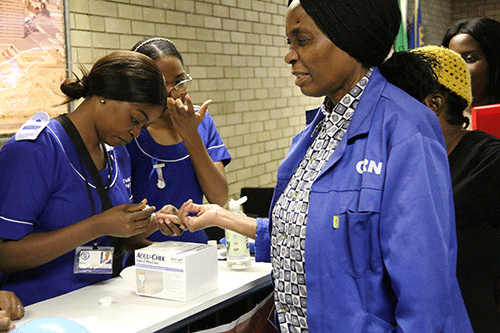Khomas regional health authorities have recorded a significant increase in diabetes figures – from 6 403 in 2022 to 10 802 for the 2023 period at public hospitals around the region.
Diabetologist Hileni Samuel from the Windhoek Central Hospital said statistics indicate that as a result of diabetes, 24 amputations were done at the hospital, and 54 at the Katutura Intermediate Hospital. “We have in total 10 802 persons who have been diagnosed already, and this is just the tip of the iceberg. So, the figures might be higher and diabetes mellitus type 2 accounts for 90% of the cases,” said Samuel on the occassion of World Diabetes yesterday.
The disease is usually caused by lifestyle factors such as physical inactivity and being overweight. Diabetes mellitus is a chronic metabolic condition characterised by elevated levels of blood glucose, resulting from defects in insulin secretion, insulin action or both.
Samuel said over time, it leads to serious damage to the heart, blood vessels, eyes, kidneys, nerves and the brain.
Adopting a healthy diet, regular exercise, maintaining a healthy body weight and regular checking of blood pressure are some key steps which can be taken to prevent getting diabetes.
Living with diabetes
Diabetes patient Brigitte Araes (61) said when it comes to eating, it is important to consume fruits and vegetables as recommended. But under the current economic circumstances, it is almost impossible to afford this to suit her dietary needs, so she ends up eating what is available.
“I was diagnosed eight years ago, and the diabetes affected my sight to a point where I developed poor visibility. I got medication to control the disease. It goes up and down occasionally, but I am coping with it,” she stated.
Araes said through the grace of the Lord, she keeps holding on. This is also thanks to the medication and assistance from the medical professionals who have thoroughly informed her of the disease.
“I encourage Namibians to get tested because once diagnosed, diabetes is a disease one lives with forever. So, taking medication at the right time is a must. Doctors say that we have a chance to lead a good lifestyle, provided that precautions are followed,” she added.
Araes said she is eternally grateful that her condition has not led to any amputations as experienced by her fellow countrymen and women, adding that diabetes equally requires mental strength, and must be treated like any other disease.
“There are other people in my family who also have diabetes. My sister had it, but she has now passed away. My sister’s child also has diabetes, so we have the disease making turns in the family,” she shared sadly.
Fellow patient Magrieta |Uiras (65) has been diabetic for four years, and injects herself four times a day.
Like Araes, |Uiras almost went blind a year ago. Her eyesight is poor, and she has been in and out of hospital.
“I am better than before, and the doctor has recommended that I get glasses. I haven’t acquired them yet, but I will make sure I get them,” she said.
She recalled her aunt who turned blind and later died due to diabetes, adding “my husband was also diabetic, and succumbed to that two years ago”.
“My sugar level was very low, but thank God it is better now. To the young people, there are times when we don’t have and sometimes can’t afford fruits and vegetables, but let us try to eat healthy and maintain a good diet and ensure that we drink enough water daily,” said |Uiras.
She observed that it is not easy having such a disease, and she is constantly reminded that she lost the love of her life to the disease.
“It is not easy for me, and for all those who are diabetic. I have lost people due to this disease. When my husband was alive, we planted fruit in our back garden. But due to financial constraints, I am unable to maintain that,” said the Okahandja Park resident.
She admitted that when the funds are there, she does try to buy the recommended dietary foods, but that is on rare occasions.
“It is difficult to maintain a healthy diet under these circumstances. To add salt to injury, staying in Okahandja Park while one has medication that needs refrigeration is also not an easy task. You end up throwing it away, and we are still waiting for the councillors who said they will assist with bringing electricity to the area,” lamented |Uiras, who added that she has a neighbour who has been amputated because of diabetes.
Death
Deputy health minister Ester Utjiua Muinjangue said diabetes is one of the leading causes of death among Namibian people. It poses devastating health and socio-economic consequences for individuals, families and communities, and overwhelms the healthcare system.
“Living with diabetes or other chronic conditions are more likely to have poor infectious diseases’ outcomes such as slow recovery from diseases, faster progression to diseases and eventually death, in comparison to those without co-morbidities,” she noted.
Mary Nana Ama Brantuo from the World Health Organisation said in Namibia, available statistics reveal that nearly 7% of Namibian adults have diabetes, with an estimated 90 000 people living with the disease. Nearly 54% of people living with diabetes are still undiagnosed in Africa,” she continued.
Brantuo said: “Countries need to invest in making essential oral anti-diabetes medicines, insulin, glucometers and test strips available to all communities. This should be backed by training health workers in diabetes prevention and management at the district and community levels towards improving service availability.”
– psiririka@nepc.com.na
Caption:


